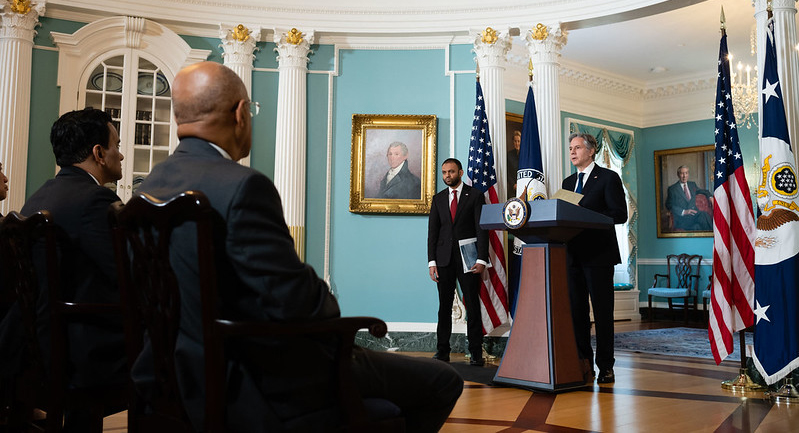Washington, D.C. — The U.S. State Department released the report on International Religious Freedom in 2022 on Monday and Ambassador Rashad Hussain said, "The People’s Republic of China seized, imprisoned, and banished predominantly Muslim Uyghurs to re-education camps. They continue the repression of Tibetan Buddhists, Chinese Christians, and Falun Gong practitioners – many of whom are fleeing the PRC’s abuses."
The 2022 Report on International Religious Freedom of the Department of State, released on May 15, 2023, the report provides a factual overview of the state of religious freedom in nearly 200 countries and territories around the world.
At the press conference for the release of the International Religious Freedom Report 2022, Secretary Antony Blinken said, "the report also documents the continuation and, in some instances, the rise of very troubling trends. Governments in many parts of the world continue to target religious minorities using a host of methods, including torture, beatings, unlawful surveillance, and so-called re-education camps. They also continued to engage in other forms of discrimination on the basis of faith or lack of faith, like excluding religious minorities from certain professions or forcing them to work during times of religious observance."
At the press conference, U.S. Ambassador at Large for International Religious Freedom Rashad Hussain said, "The People’s Republic of China seized, imprisoned, and banished predominantly Muslim Uyghurs to re-education camps. They continue the repression of Tibetan Buddhists, Chinese Christians, and Falun Gong practitioners – many of whom are fleeing the PRC’s abuses."
The 2022 Report on International Religious Freedom stated,"In the Tibet Autonomous Region (TAR) and other Tibetan areas, there were reports of forced disappearances, arrests, physical abuse, and prolonged detentions without trial of monks, nuns, and other persons due to their religious practices. There were reports of individuals dying in custody after being beaten."
"The CCP continued to promote Sinicization policies that aimed to reinterpret and rewrite religious doctrines to bring them into accordance with CCP ideology and emphasize loyalty to the CCP and the state. Authorities required monks and nuns to undergo political indoctrination," the report added.
"Authorities continued to restrict the religious practices of monks, nuns, and laypersons, including by prohibiting them from hanging prayer flags or burning incense. Authorities also continued to force monasteries to display portraits of CCP leaders and required Tibetans to replace images of the Dalai Lama and other lamas in their homes with portraits of CCP leaders, including former chairman Mao Zedong and General Secretary and PRC President Xi Jinping. Images of the Dalai Lama were banned, with harsh repercussions for owning or displaying his image. Repression, including arbitrary surveillance, increased around politically sensitive events, religious anniversaries, and the Dalai Lama’s birthday. Officials reportedly used COVID-19 pandemic restrictions as a pretext to close temples and prevent individuals from participating in religious activities.," the report stated.
The State Department has also expressed concern about Chinese colonial boarding schools in Tibet, which attempt to eradicate Tibetan culture, and said,"In an effort to Sinicize the population, authorities forced approximately (Tibetan) 900,000 children, some as young as four years old, to attend boarding schools that emphasized Han Chinese culture and required the use of Mandarin."
The report also stated,"The PRC continued to tightly restrict access to the TAR, and no U.S. diplomats visited the TAR or Tibetan autonomous prefectures (TAPs) during the year. U.S. officials repeatedly raised concerns about religious freedom in Tibet with Chinese government counterparts at multiple levels. U.S. officials, including the Special Coordinator for Tibetan Issues, the U.S. Ambassador, and other Department of State and U.S. embassy officers continued sustained and concerted efforts to advocate the rights of Tibetans to preserve, practice, teach, and develop their religious traditions and language without interference from the government. U.S. officials underscored that decisions on the succession of the Dalai Lama should be made solely by the Tibetan people, free from interference, and they raised concerns about the disappearance since 1995 of Panchen Lama Gedhun Choekyi Nyima."
"Children younger than 18 are prohibited from participating in religious activities and receiving religious education, even in schools run by religious organizations. Enforcement and implementation of these rules vary widely across and within regions. One regulation states that no individual may use religion to hinder the national education system and that no religious activities may be held in schools. These regulations have effectively barred Tibetan youth from entering monasteries prior to reaching 18 years of age," the religious freedom report said.
"CCP members and retired government officials, including Tibetans, are required to be atheists and are forbidden from engaging in religious practices. CCP members who are found to belong to religious organizations are subject to various types of punishment, including termination of their employment and expulsion from the CCP," the report added.


![Tibet has a rich history as a sovereign nation until the 1950s when it was invaded by China. [Photo: File]](/images/stories/Pics-2024/March/Tibet-Nation-1940s.jpg#joomlaImage://local-images/stories/Pics-2024/March/Tibet-Nation-1940s.jpg?width=1489&height=878)
















